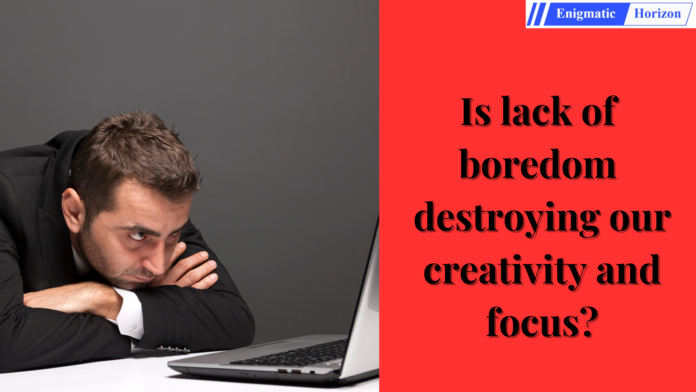Aniket Bin
In today’s fast-paced, tech-minded society, boredom seems like a forgotten emotion. With smartphones and internet always within our reach, we have become addicted to constant stimulation, a big thanks to the Ambanis for revolutionizing our lives with affordable internet, because who wouldn’t want to trade their precious time for endless scrolling? Social media platforms like Instagram and Facebook, endless streaming services like YouTube and Netflix, and mindless mobile games acts like an “Any Where Door” helping us escape from the feeling of boredom.
But do we ever stop to ask ourselves what we are losing in the process? We think that these services are free to use but in reality, our minds, our creativity, and our future pay the price for this mindless entertainment.
Why have we forgotten how to be bored?
Whenever we feel boredom, we immediately try to reach out for our phones. Are we so afraid of being alone with our thoughts that we prefer constant distractions, even when they don’t add any value to our life? Our forefathers didn’t have this constant access to technology in fact, boredom was a natural part of their life allowing them time to reflect and come up with creative solutions to their problems. History witnessed great minds like Nikola Tesla and Leonardo Da Vinci, who found inspiration and came up with great ideas and discoveries during the moments of boredom and calmness. They allowed their minds to wonder, which our generation think is a huge burden.

When was the last time you sat quietly without thinking how many likes do I have on my Instagram photo or how many views do I have on my Whatsapp status? Studies show that boredom can actually help our brain come up with new ideas by connecting various thoughts in unexpected ways. By always keeping our minds busy with social media, we are missing out on the creative thinking that can happen when we let ourselves feel boredom.
Are we becoming “Dumber”?
There’s this growing concern that today’s generation is becoming “Dumber” thanks to their dependence on technology. Instead of spending time reading books to gain knowledge young people prefer listening to podcasts on YouTube. It’s like drinking water from a firehose, sure we get a lot of information but it’s all surface level.
The question is, are we sacrificing in depth knowledge for speed? Young people are so busy consuming those 30 second reels and shorts that they are losing their ability to focus and analyze things. Sure, enjoy that reel but also make some time to really think, read and reflect. Make sure you know that there is a “real” outside a “reel”. The key is balance, otherwise, you’ll end up with an attention span of a goldfish and let’s be honest, they don’t seem to be solving any big problems anytime soon!
Is today’s generation suffering from a Dopamine Overdose?

The rise of social media and instant entertainment has made dopamine our brain’s go-to drug. Dopamine also known as the “feel good” hormone, is released whenever we experience pleasure or satisfaction all thanks to our phones and affordable internet, we have found a way to get an unlimited supply of it.
It feels really great to get that instant satisfaction, but the problem is that we have grown addicted to these tiny dopamine spikes. Our brain is always searching for that next digital high and when we don’t get it, we feel restless or anxious.
This constant dopamine rush is doing more harm than good. Our brains are getting used to this constant supply of dopamine, making it harder for us to focus on more meaningful things. Just think about it – how many times have you tried focusing on a task only to get distracted by your phone within a few minutes? This happening because your brain is just looking for that next dopamine boost.
How can we fix our minds?
In a world where mental illnesses are on the rise, it is important that we practice mindfulness to better care for our mental health. If we really want to reclaim control over our minds and restore our ability to think, reflect and create, here’s how we can start:
One of the most effective ways to control your dopamine rush is by setting boundaries with your phone or whatever device you use to consume media. This small step will allow you to explore things and will free up your mental energy for more meaningful activities like reading, spending time with your loved ones and learning a new skill or a hobby.
If you are not willing to sit down and meditate for 30 minutes a day, the least you can do is sit quiety and observe your thoughts. Just remember that boredom isn’t your enemy but a friend, it’s a tool to cultivate an environment where we can let our minds wonder and reach new heights. It all comes down to the choices we make now. Are we ready to prioritize depth over distraction or will we allow ourselves to be pulled into this hollow world of mindlessness?
